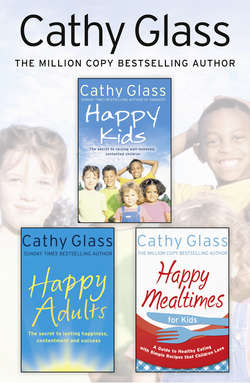Читать книгу Cathy Glass 3-Book Self-Help Collection - Cathy Glass, Cathy Glass - Страница 37
Play and being playful
ОглавлениеPlay is essential for children of all ages. Through play, children learn and develop as successful individuals, and also as members of society. Play with your child, enjoy his or her company and interact with your child through talk and play. Working alongside your child, in play or doing small jobs together (which is a type of play), builds comradeship, cooperation and respect, resulting in fewer challenges to you and your authority.
Play is an excellent medium for swapping little details of your lives, showing your personality and building the bond between you. You don’t have to make great revelations about yourself: just talk about small preferences or make observations. You might say, ‘I love that colour red in the flower puzzle. It’s the same shade as your T-shirt.’ You have shared a little piece of you – a small like – and your child will respond, revealing a little bit about him or herself – ‘I like it too, Mummy,’ or ‘I like that blue better.’ Sharing little details about ourselves is what successful relationships are built on; it is how children and adults get to know each other and sustain lasting relationships.
Encourage siblings to play together but don’t force them, and don’t expect siblings to play together all the time. Siblings, no matter how close, still need to do their own thing sometimes – even twins need their own space to develop their personalities.
Role playing is good for bonding, and also great fun. Playing shops is an old and enduring favourite, with the child, sibling or parent taking turns to be the shopkeeper. Play food and plastic money can be used, or tins and packets from the kitchen and coins from your purse.
Board games are great for teaching cooperation and fairness, but they also have the potential to degenerate into argument, particularly if a child is very competitive and needs to win. Teach your child from an early age, by example, that it is not the winning of the game but the playing that is fun, and the aim of the activity. A child (or adult) chirping loudly at the end of a game that he or she has won rankles me, not to mention the other children playing. I have a saying, passed on to me by my father, and to him by his father: ‘When you win, say nothing, and when you lose, say even less.’ I love this maxim, and children of all ages and abilities understand its philosophy when it is explained to them; I’ve even heard them repeating it to other children when playing with a loud, self-praising winner.
If a particular game has the habit of degenerating into argument, then put it away and get it out again only on the understanding that everyone plays nicely. Our game of Monopoly regularly takes time out. I don’t know what it is about Monopoly, for it is a great game for all the family, but it also has the potential for escalating competitiveness, resulting in accusations of cheating from even the most placid of children.
Obviously don’t allow cheating in any game; it is a form of lying, and undermines the whole concept of game playing, as well as sanctioning deception. If a child persistently cheats, then use the 3Rs to modify his or her behaviour, putting away a game away if necessary or stopping a role-playing game.
Playing fairly and taking turns is important for a child’s behavioural development, and in forming relationships with others, so don’t ignore or dismiss what might seem trivial. If the child has cheated once and got away with it, he or she is more likely to do it again. Request – ‘Tom, play fairly. There is no point in playing if you are going to cheat.’ Repeat with a sanction if necessary – ‘Tom, if you can’t play the game fairly and allow others their turn, I will put the game away.’ And do so if necessary, getting it out again only when Tom agrees to play fairly by the rules.
If you have a group of children all squabbling over a game, then address your Request to play fairly to the group – ‘Play fairly and take turns. There is no fun in playing that game if you are all going to argue.’ Repeat, with the warning of the sanction if necessary; if this fails, then take the game away and find something else to amuse them with.
As well as playing with your child, be playful. Many situations can be lightened by a playful word or comment, and it’s lovely for your child to see your sense of humour. Your child will pick up and imitate your humour, just as he or she does your other behaviour. I have found that even children with severe learning difficulties, and those who carry a heavy burden from previous abuse, can tune in and respond to humour. It is heart-warming to see a seriously disadvantaged child laugh at a joke or see the humour in a situation. Not only is it good therapy but it is a good philosophy for life – humour allows us to deal with many otherwise untenable situations.
